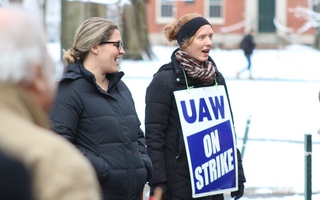{shortcode-759fce4f8de33d6e534718c372e2b717dd2d812b}
Harvard may have illegally asked some hiring managers to confirm with prospective teaching staff whether they plan to begin teaching on time next semester, potentially making their employment contingent on a promise not to remain on strike even if a contract is not reached by then, labor law experts said.
The email, which was obtained by The Crimson, recommends departments include a provision in postings and offer letters that conditions teaching fellow positions on whether candidates can commit to a start date or not.
Harvard Graduate Students Union-United Automobile Workers went on strike Dec. 3 and has vowed to continue indefinitely until a contract is reached. While the two parties have agreed on 12 tentative contract provisions during the 13-month-long negotiation process preceding the strike, differences remain on key issues such as compensation, health care, and a grievance procedure to adjudicate sexual harassment and discrimination complaints.
The two sides have not met for a bargaining session since the strike began, though they have scheduled a three-hour session for Dec. 18.
In the email dated Dec. 6, Associate Director for Student Engagement at the Office of the Provost Marshall P. Page wrote that a promise to start on the first day of the contract amounted to a promise not to participate in the strike.
“If the candidate says that they can commit to that date, then we can assume that they are not honoring the strike and will report to work,” the email reads. “If they can’t make that commitment, then the hiring unit would not hire the candidate.”
Page also wrote in his email that it is “permissible” to reference the strike explicitly in offer letters.
“‘Due to the current HGSU-UAW labor strike, and since this offered position is a bargaining unit position, we need to know whether you will commit to starting employment on that date if the strike is continuing,’” Page wrote in a section suggesting example language for offer letters.
In an emailed statement, University spokesperson Jonathan L. Swain declined to confirm the email’s source. Page did not immediately respond to a request for comment Thursday evening.
Labor experts said that the recommended language may violate Section VII of the National Labor Relations Act, which grants employees the right to engage in protected activities, including strikes. The NLRA also prohibits employers from either discouraging or encouraging union activities or sympathies.
Former National Labor Relations Board Chairman William B. Gould IV said the recommendation contained in Page’s email would not be consistent with the law.
“It seems to me that to require them to make a determination that they’re not going to strike would be unlawful,” Gould said. “You can’t offer a job to non-strikers over strikers.”
Gould said the warning would effectively amount to creating such terms.
Swain wrote in the emailed statement that the University’s “general interest” is to determine availability to teach courses.
“The University is committed to ensuring that all of Harvard’s students can pursue and complete their academic work,” Swain wrote. “Ensuring appropriate staffing levels for academic activities is a part of that.”
The potential NLRA violation was first pointed out on Twitter. In a tweet, History Ph.D. student Jacob “Jake” P. Anbinder wrote, “Harvard is now telling departments to make grad workers commit now to not striking in the spring if we are able to be considered for TA positions.” Anbinder attached a screenshot of a portion of the email that The Crimson confirmed to be consistent with the original.
Angela B. Cornell, director of the labor law clinic at Cornell Law School, said the email’s contents “should raise a red flag.”
Cornell said that while there is no issue with asking people to commit to a start date, she found the language tying employment to an implicit agreement not to strike to be “disconcerting.”
Cornell said that the recommendations could be “inherently destructive of Section VII rights” by discouraging protected union activity.
“It potentially could discriminate against candidates based on their sympathy...for the strike,” Cornell said. “I think that raises real concern about its compliance with the statute.”
Cornell said, however, that Harvard could potentially justify the communication by showing a “substantial business justification.”
Though alleged violations of the NLRA can be enforced by bringing a case to the National Labor Relations Board, Gould said that students may be loathe to do so because the NLRB could take such a case as an opportunity to reverse their status as employees.
A 2016 NLRB decision involving graduate student workers at Columbia University provided the legal basis for graduate student unionization at private universities nationwide. The current board proposed a rule in September, however, that would essentially reverse the 2016 decision. It is currently in a public comment period.
“The board is likely to say they can’t protect them because they’re not employees within the meaning of the Act and they would take that opportunity to reverse [the] Columbia University [decision],” Gould said.
—Staff writer Molly C. McCafferty contributed reporting to this story.
—Staff writer James S. Bikales can be reached at james.bikales@thecrimson.com. Follow him on Twitter @jamepdx.
—Staff writer Michelle G. Kurilla can be reached at michelle.kurilla@thecrimson.com. Follow her on Twitter @MichelleKurilla.
—Staff writer Ruoqi Zhang can be reached at ruoqi.zhang@thecrimson.com. Follow him on Twitter @RuoqiZhang3.
Read more in News
Harvard Students Occupy Admissions Office to Protest Tenure Decision, Demand Ethnic Studies Department
















